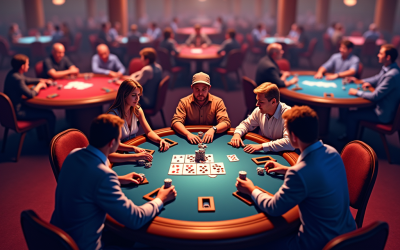Understanding Sports Betting Psychology
Sports betting psychology involves natural chemical responses and emotional triggers that directly impact decision-making and wagering choices. The brain’s chemical reactions, physical responses, and cognitive patterns shape betting behavior, making a controlled and strategic betting approach essential.
Key Takeaways
- Dopamine release occurs before knowing bet outcomes, potentially encouraging risky behavior.
- Physical responses like increased heart rate and cortisol levels can impair judgment during betting.
- Setting strict betting limits and predetermined strategies helps override emotional impulses.
- Loss aversion causes twice as much emotional pain from losses compared to pleasure from wins.
- Taking regular breaks after significant wins or losses helps maintain emotional control.
Dopamine and Anticipation
My knowledge of brain chemistry and betting psychology points to dopamine playing a central role in creating excitement and anticipation before bets resolve. This chemical reward system can drive impulsive decisions, leading bettors to chase losses or increase stakes beyond planned limits.
Physical Reactions and Impaired Judgment
Physical reactions like elevated heart rate, sweating, and stress hormones further complicate rational decision-making. These bodily responses often signal heightened emotions that need management through prepared strategies and firm betting rules.
The Role of Loss Aversion
Loss aversion remains a significant factor, as research shows losses create emotional impacts twice as powerful as equivalent wins. I recommend building resistance through strict bankroll management and accepting losses as a normal part of betting.
The Importance of Taking Breaks
Taking strategic breaks helps reset emotional states and maintain clear judgment. This practice prevents both overconfidence after wins and desperation after losses. Smart bettors step away regularly to assess their mental state.
Conclusion: Balancing Emotion and Strategy
The combination of brain chemistry, physical responses, and psychological factors makes emotional control critical for successful sports betting. Clear strategies and defined limits provide the structure needed to make rational betting decisions.
Why Your Brain Makes Poor Betting Decisions and How to Stop It
Let’s face it – your brain can be your biggest enemy when placing sports bets. The natural chemicals and responses happening inside your head often lead to decisions that feel right in the moment but can damage your long-term sports betting success.
Dopamine, often called the “feel-good” chemical, plays a sneaky role in sports betting behavior. Each time you place a bet, your brain releases dopamine – and here’s the catch – it happens before you even know if you’ve won or lost. This anticipatory rush can push you to make increasingly risky bets, creating a cycle that’s hard to break.
Physical and Emotional Responses During Betting
Your body goes through several physical changes while betting that can cloud your judgment. These reactions include:
- Increased heart rate and blood pressure
- Higher cortisol levels (stress hormone)
- Heightened emotional sensitivity
- Enhanced focus on potential wins
- Decreased ability to process risk accurately
I’ve found that understanding basic betting principles isn’t enough – you need to recognize these biological responses to make better decisions. This becomes especially important when dealing with near-misses, which trigger similar neurological reactions to actual wins. Your brain essentially tricks you into thinking you’re “due” for a win, leading to chase betting and poor bankroll management.
The environment where you place bets matters significantly. Watching games live creates stronger emotional connections and can lead to impulsive betting decisions. The excitement of live action combined with the accessibility of mobile betting apps creates a perfect storm for emotional wagering.
To combat these biological impulses, I recommend implementing a structured approach to managing your betting bankroll. Setting strict betting limits before you start and sticking to them regardless of how you “feel” about a particular bet can help override these emotional responses.
The key to successful sports betting isn’t just about picking winners – it’s about maintaining emotional control when your brain is pushing you to make impulsive decisions. By understanding these biological responses, you can develop strategies to counteract them and make more rational betting choices.
Your best defense against poor betting decisions is maintaining a cool head and following a predetermined betting strategy. This means stepping away from betting when emotions run high, even if you’re convinced you’ve spotted a “sure thing.”
Remember: your brain’s natural responses evolved long before sports betting existed. While these responses might have helped our ancestors survive, they don’t serve us well when making calculated betting decisions. Stay aware of these biological influences, and you’ll be better equipped to make smart, strategic betting choices rather than emotional ones.
Common Mental Traps That Sabotage Your Betting Success
As a sports bettor, your mind can play tricks on you that directly impact your betting success. I’ve found that making profitable sports betting decisions requires understanding and actively avoiding these psychological pitfalls.
Key Cognitive Biases Affecting Sports Bettors
Confirmation bias shapes how I process betting information – and you’re likely doing it too. This happens when I search for stats and analysis that support my existing opinion while dismissing contradictory evidence. For instance, if I’m convinced Team A will win, I might focus solely on their recent victories while ignoring their struggling defense.
Let’s talk about overconfidence – that feeling of being “better than average” at picking winners. But here’s the reality: most sports bettors lose money long-term. This overconfidence leads to poor betting fundamentals and increased risk-taking.
The gambler’s fallacy trips up even experienced bettors. I’ve caught myself thinking “this team has lost three straight, they’re due for a win!” But each game is an independent event – previous outcomes don’t influence future results. This type of thinking leads to placing bets based on patterns that don’t actually exist.
Here are the most damaging mental traps I’ve identified in sports betting:
- Anchoring bias: Getting stuck on initial information like opening odds or pre-season predictions
- Availability heuristic: Overvaluing recent or memorable events (like dramatic upsets)
- Loss aversion: Making increasingly risky bets to recover losses
- Recency bias: Putting too much weight on the latest games while ignoring longer-term trends
- Attribution bias: Crediting wins to skill but blaming losses on bad luck
Breaking free from these mental traps starts with analyzing bets objectively. I rely on concrete data and statistical analysis rather than gut feelings or recent memories. Setting clear betting limits before games start helps prevent emotional decisions, especially during losing streaks.
I’ve learned to question my initial instincts and look for evidence that challenges my assumptions. When I find myself thinking a bet is a “sure thing,” that’s my signal to step back and re-evaluate with fresh eyes. Creating distance between emotional reactions and betting decisions has proven crucial for long-term success.
The Double-Edged Sword of Loss Aversion in Sports Betting
Understanding Loss Aversion’s Impact
Loss aversion plays a significant role in sports betting decisions, and I’ve seen how it can derail even the most calculated betting strategies. According to Prospect Theory, the pain of losing money hits about twice as hard as the pleasure of winning the same amount. For example, losing $100 on a bet creates much more emotional distress than the joy felt from winning $100.
This psychological principle directly affects how to make smarter betting decisions and can lead to some risky behaviors. When losses occur, many bettors shift from their original strategy and start making increasingly larger bets, hoping to recover quickly.
Breaking the Loss Recovery Cycle
Here are key warning signs that loss aversion might be affecting your betting choices:
- Making larger bets than usual after a loss
- Betting on unfamiliar sports or markets to chase losses
- Ignoring your predetermined betting limits
- Betting more frequently than your normal pattern
- Making rushed decisions without proper research
I’ve found that successful sports bettors treat betting fundamentals and bankroll management as essential skills. Setting strict betting limits and sticking to them, regardless of previous outcomes, helps prevent emotional decisions driven by losses.
The psychological impact of losses can create a dangerous cycle — the more you lose trying to recover previous losses, the stronger the urge becomes to place bigger bets. This pattern often signals the early stages of problem gambling behavior, as research has shown direct links between loss chasing and gambling addiction symptoms.
To maintain control, I recommend treating each bet as an independent event. Your previous wins or losses shouldn’t influence your next bet’s size or selection. Instead, focus on consistent research, analysis, and disciplined betting practices. This approach helps protect against the natural psychological pull of loss aversion while building sustainable betting habits.
Remember, successful sports betting requires managing both your money and your emotions effectively. Learning to recognize and resist the urge to chase losses is just as important as understanding betting odds and markets.

When the Crowd Gets it Wrong: Social Influences on Betting
Social pressure can significantly impact sports betting decisions and outcomes. Public betting percentages often create a ripple effect, pushing more bettors to follow what seems to be the “smart money.” I’ve noticed this behavior becoming more prominent with the rise of social media, where trending picks and popular opinions spread like wildfire.
Breaking Down Social Betting Influences
The fear of missing out (FOMO) has become a major driver in sports betting decisions. When a game gets substantial attention on social media platforms, many bettors jump in without proper analysis, worried they’ll miss a winning opportunity. This emotional response can lead to poor betting choices and impulsive wagering.
Here are the key ways social influence affects betting decisions:
- Consensus bias – Following the crowd’s predictions without independent research
- Social media amplification – Popular picks gaining traction through shares and likes
- Peer pressure – Making bets to fit in with friends or online communities
- Emotional contagion – Getting caught up in the excitement of trending bets
- Information cascades – Assuming others have better information and following their lead
One interesting strategy that’s gained traction is “fading the public” – deliberately betting against popular opinion. This approach can be effective because mass behavior often creates market inefficiencies. When too many bettors pile onto one side of a bet, the odds may shift away from their true value, creating opportunities for contrarian bettors.
I’ve found that successful sports betting requires maintaining independence from social pressures. Instead of following the crowd, focus on developing a solid understanding of different bet types and making decisions based on thorough research and analysis.
The wisdom of crowds isn’t always wise in sports betting. While public consensus might occasionally point toward winning bets, blindly following the majority often leads to consistent losses over time. Your best defense against social influence is a well-planned betting strategy backed by careful analysis and emotional control.

Proven Methods to Keep Emotions Out of Your Betting
Smart Betting Strategies for Emotional Control
I recommend starting with a solid bankroll management system to help remove emotional impulses from your betting decisions. Setting a strict 1-3% maximum stake per bet creates a protective barrier against substantial losses while maintaining consistent betting patterns. This approach is crucial for making wise sports betting decisions that aren’t clouded by emotion.
Data should drive your betting choices, not gut feelings or hunches. I’ve found that implementing a detailed tracking system helps maintain objectivity in your betting approach. Track these key elements for each bet:
- Win/loss outcome
- Stake amount
- Odds received
- Sport and market type
- Reasoning behind the bet
- Emotional state when placing the bet
Creating fixed criteria for bet selection helps eliminate impulsive decisions. Before placing any wager, make sure it meets your predetermined requirements for fundamental sports betting analysis.
Taking breaks is essential, especially after big wins or losses. I suggest stepping away from betting for at least 24 hours after any significant outcome to reset your emotional state. This cooling-off period helps prevent chase betting after losses or overconfident betting after wins.
Your physical and mental state directly impacts your decision-making ability. Avoid placing bets when:
- Feeling stressed or anxious
- Under the influence of alcohol
- Experiencing sleep deprivation
- Dealing with strong emotions
By incorporating these methods into your betting routine, you’ll develop a more disciplined and analytical approach to sports betting. Remember that successful betting requires treating each wager as a calculated investment rather than an emotional reaction to circumstances.
A consistent approach to managing your bankroll effectively combined with emotional control will lead to better long-term results. Stay committed to your predetermined betting criteria and always prioritize rational decision-making over emotional impulses.

Sources:
Prospect Theory: An Analysis of Decision under Risk – Kahneman & Tversky
Journal of Gambling Studies – Near-misses in Gambling: A Review
National Council on Problem Gambling – Sports Betting Risk Behaviors Fact Sheet
Psychology Today – Decision Making Under Pressure
The Role of Cognitive Bias and Skill in Gambling – Mark Griffiths
Behavioral Economics: Past, Present, and Future – Richard Thaler





